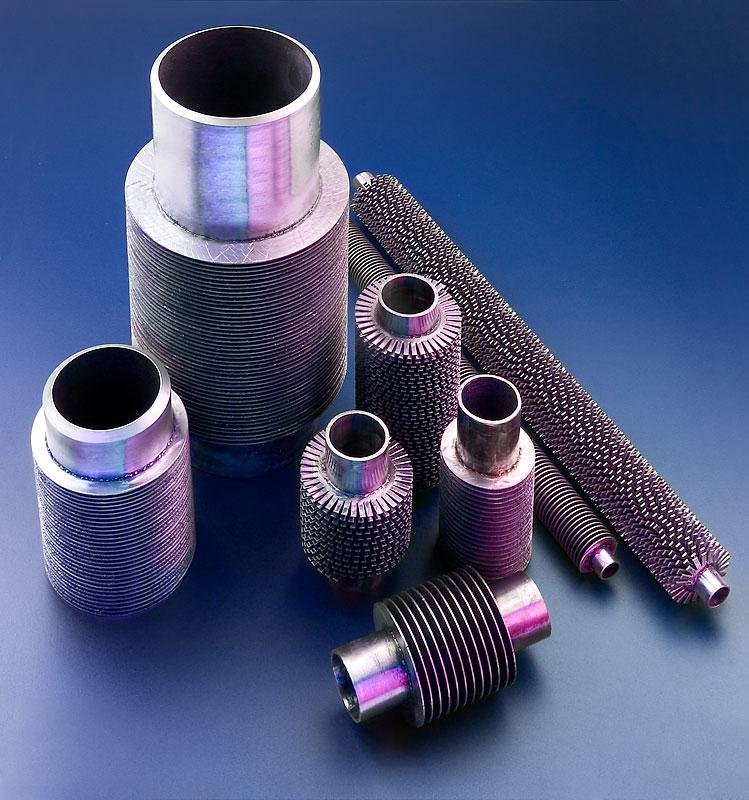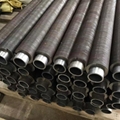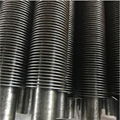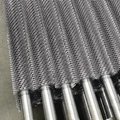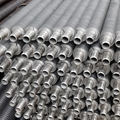| Model: | - |
|---|---|
| Brand: | JY |
| Origin: | Made In China |
| Category: | Industrial Supplies / Machinery / Heat Exchange & Air Conditioners |
| Label: | fin tube , finned tube , HFW fin tube |
| Price: |
-
|
| Min. Order: | - |
Product Description
Fin tubes are a type of heat exchanger used in many industries. They are made of aluminum cladded carbon steel and have brazed aluminum fins. The fins increase the surface area of the tubes, which allows them to transfer heat more efficiently. This makes them ideal for applications where high heat transfer rates are required.
Finned tubes are used in applications that involve the transfer of heat from a hot fluid to a colder fluid through a tube wall. They are used in condensers, coolers, and furnaces. The larger surface area means that fewer tubes are needed compared to the use of plain tubes.
The type of finned tube is chosen depending on the specific requirements of each process equipment unit. The fin type and combination of materials are chosen based on the specific requirements of each process equipment unit.
Why use finned tubes?
Finned tubes are used in applications where high heat transfer rates are required, such as in power plants and refrigeration systems. The fins increase the surface area of the tube, allowing for more efficient heat transfer between two fluids. This makes them an ideal solution for heat transfer applications where space is limited.
Finned tubes are used in condensers, coolers, and furnaces. The larger surface area means that fewer tubes are needed compared to the use of plain tubes. This can decrease the overall equipment size and can in the long-run decrease the cost of the project.
Finned tube heat exchangers can be used in a broad range of industries including oil & gas, power generation, marine and HVAC&R. They generally use air to cool or heat fluids such as air, water, oil or gas, or they can be used to capture or recover waste heat.
The biggest problem with using a finned tube heat exchanger is with the cleaning and maintenance of the outer surface of the tubes. Because of the fins, mechanical cleaning becomes very difficult and you would have to go for chemical cleaning.
What is the difference between fin tube and finned tube?
Fin tubes are a type of heat exchanger that are used in many industries. They have a finned surface, which increases their surface area and allows them to transfer heat more efficiently. Finned tubes are typically used in two-phase heat transfer applications, such as condensation or evaporation.
Finned pipes are generally used for single-phase heat transfer applications. Both finned pipes and finned tubes use fins to increase the surface area for heat transfer.
Finned tubes are used when the heat transfer coefficient on the outside of the tubes is appreciably lower than that on the inside. They can reduce the equipment cost and also equipment sizes.
There are several kinds of fin tubes, such as:
Extruded fin tube
Crimped spiral fin tube
G type embedded fin tube
L/KL/LL Foot Fin Tube
What is the difference between high fin and low fin tubes?
High fin tubes are better for applications where the temperature difference between two fluids is high. Low fin tubes are better for applications where the temperature difference is low.
High fin tubes are made of a metal tube surrounded by an aluminum or copper strip. The strip can be applied in different ways, including type L, type KL, type LL, type G (embedded), or type extruded. The higher the fin height, the more surface area and heat transfer capabilities.
Low fin tubes are made of a single material and have a smaller fin of about 1/16th of an inch. They are generally used in liquid to liquid or liquid to gas applications such as coolers, condensers, and chillers.
The profile of the fins has a significant effect on the performance of a finned tube heat exchanger. The larger the fins and the tighter the fin pitch, the more thermal conductivity is achieved.
What is the role of finned tube in heat transfer?
Finned tubes are a series of tubes with fins on the outside. The fins increase the surface area for heat transfer, which increases the rate of heat exchange. Finned tubes are used in heat exchangers to transfer heat between hot and cold streams. The heat transfer rate depends on the temperature difference between the two fluids and the heat transfer coefficient between each of the fluids.
Finned tube heat exchangers are used in a variety of industries, including:
Oil and gas
Power generation
Marine
HVAC&R
Finned tube heat exchangers can be used to:
Cool or heat fluids such as air, water, oil, or gas
Capture or recover waste heat
Finned tubes come in two types: transverse and longitudinal.
What is the heat transfer in tube and fins?
Heat transfer in tube and fins is a process that involves a fluid passing through tubes and conducting heat to fins. The fins then dissipate the heat to air that is blown over them. The fins increase the surface area for heat transfer, which increases the rate of heat exchange.
The amount of heat an object transfers is determined by the amount of conduction, convection, or radiation. The thermal flux is a function of both the thermal conductivity of solid parts and the convection heat coefficient between the gas and the surrounding walls. The shape and dimensions of the tubes and fins also affect the convection heat coefficient.
In an air-cooling fin-and-tube heat exchanger, heat transfers from the air flowing outside tubes to the liquid flowing inside the tubes. Because air has low thermal conductivity and density, it has poor heat transfer capability.
Member Information
| SHANGHAI JUYE MATERIAL TECHNOLOGY CO.,LTD | |
|---|---|
| Country/Region: | Shang Hai - China |
| Business Nature: | Manufacturer |
| Phone: | 15821988586 |
| Contact: | Lyndon (Manager) |
| Last Online: | 15 Nov, 2024 |
